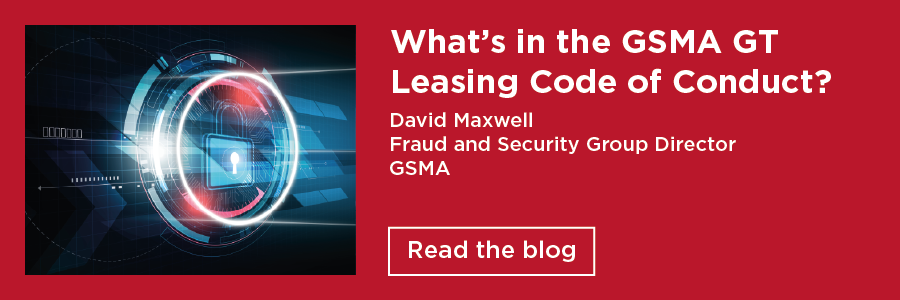Increasing transparency, reducing risk
A global title (GT) is an address used for routing signaling messages (using the Signalling Connection Control Part / SCCP protocol) on telecommunications networks. National authorities allocate numbering resources to communications providers, which reserve and use part of those numbers for use as GTs. In mobile networks, GTs enable information to be exchanged within and between networks, so that mobile services work regardless of whether a user is in his/her home network or roaming.
The practice of leasing GTs (by a “GT lessor” to a “GT lessee”) has enabled additional entities (GT lessees) to gain access to the global SS7 network and to exchange signalling messages using GTs associated with the GT lessor. This reduces routing transparency, and has led to concerns that such GT leasing practices introduce security risks for mobile network operators and their customers.
GSMA members have developed a GT leasing reference document (FS.52) that describes GT leasing motivations, benefits, issues and concerns. The document also contains a code of conduct detailing requirements and guidelines intended to minimise risks associated with GT leasing. GT lessors and transit carriers involved in GT leasing arrangements are invited to voluntarily declare to their partners, as part of bilateral agreements, that they adhere to the GT Leasing Code of Conduct, as evidence of their commitment to routing transparency and to reduce the risks for mobile network operators and their customers. Operators and carriers that do not lease GTs are also encouraged to show their support for the Code of Conduct by requesting compliance by their suppliers and partners in relevant service, roaming and/or interconnect agreements.
Benefits of Code of Conduct Compliance
Benefits to companies involved in GT leasing
- Reduce the risk of abuse of their assets (assigned numbering resources used for GT addresses, transit carrier infrastructure)
- Reduce the risk of reputational damage to their businesses associated with GT leasing abuse involving their assets.
- Demonstrate commitment to transparency, traceability and accountability in relation to interconnect signalling involving GTs
- Reduce risks associated with GT leasing for industry partners with which they are interconnected.
Benefits to GSMA members and Industry
- Gain assurance from suppliers and partners who have declared a commitment to industry-agreed best practices that reduce the risks of abuse associated with the lack of transparency of traffic from/to leased GTs.
- Enhanced protection of mobile users and their service providers against privacy and security risks associated with GT leasing.
- Alleviate regulatory concerns and reduce need for regulatory intervention by demonstrating industry’s ability to take appropriate and pragmatic action to reduce threats posed by GT leasing.
Blogs
GT Leasing Code of Conduct Exceptions
Monday 11 March, 2024 | Latest News
Why has the GSMA legitimised some Global Title Leasing Use Cases? The GSMA’s Global Title Leasing Code of Conduct, “CoC”, PRD FS.52, has rightly set new expectations for acceptable Global Title (GT) leasing practices. From now on, any party engaged in this activity that ...
Why is GT Leasing Transparency Needed?
Monday 15 January, 2024 | Latest News
The perspective of operators that do not perform GT leasing and why they welcome FS.52. In the complex world of telecommunications, Global Title (GT) leasing has become an integral aspect of network management, enabling some operators and enterprises to efficiently route and ...
What’s in the GSMA Global Title Leasing Code of Conduct?
Wednesday 1 November, 2023 | Latest News
Introduction This post summarises FS.52 “GT Leasing Code of Conduct” (CoC), focussing on the requirements placed on the companies that declare compliance with the CoC. For full details, see FS.52, which takes precedence. First, some terminology and relationships: A GT lessor ...
Fighting back against the abuse of Global Title Leasing
Thursday 5 October, 2023 | Latest News
Fighting back against the abuse of Global Title Leasing Do you remember when making an international call didn’t involve just dialling the person you wanted to speak to and connecting shortly afterwards? Perhaps you are old enough to remember calling an operator and asking ...
Resources
At the Security Summit at Mobile World Congress (MWC) Barcelona 2024, Stephen Ornadel, Chair of the GSMA Global Leasing Task Force and Johannes Opitz, Vice President Commercial Roaming & International Mobile Wholesale, Telekom Deutschland GmbH outline the importance of the Global Title Leasing Code of Conduct. Their presentation begins at 27m33s.
Key Documents
FS.52 – Global Title Leasing Code of Conduct
Wednesday 29 Mar 2023 |
This document is a reference document addressing the leasing of Global Titles used within SS7 networks, motivations for this practice, how they are used and a code of conduct to prevent abuse and the introduction of undesirable risks for MNOs...








